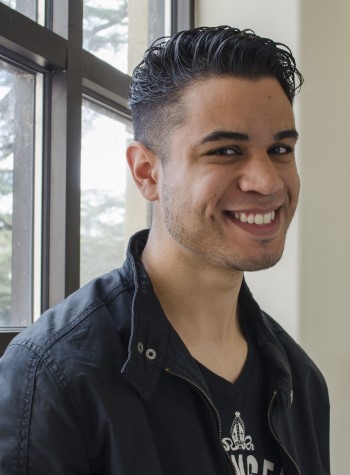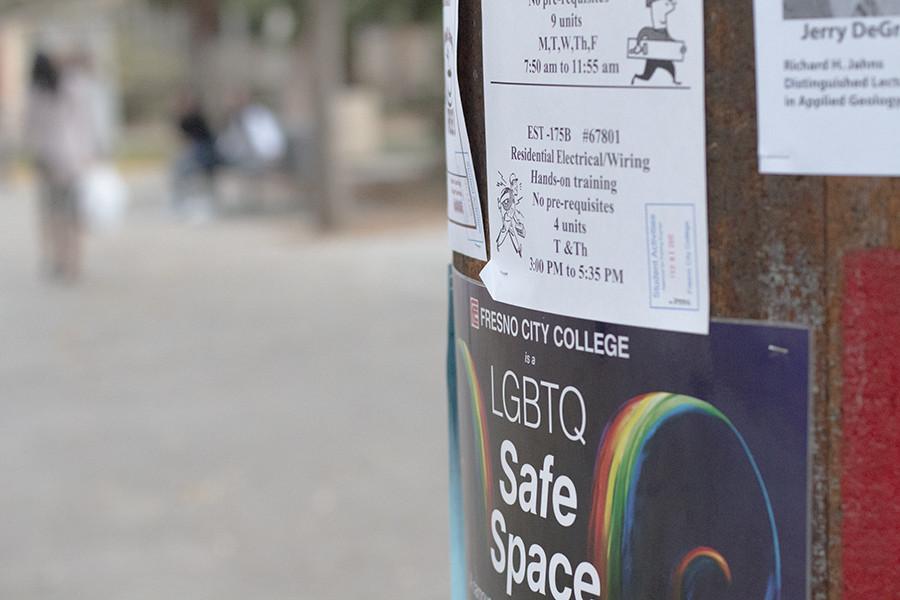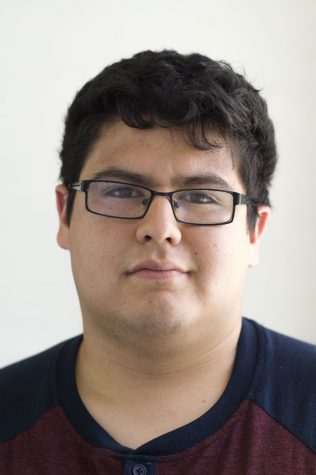Thurston Says He’s Pleased with ‘Safe Space Ally Program’
Photo by: Larry Valenzuela
LGBTQ Safe Space located at various parts of Fresno City College. Dec. 8, 2015.
Communication professor Jerry Thurston said he is pleased with the results of the workshops he has been providing to classified staff, student leadership and the Associated Student Government since the establishment of the Fresno City College Safe Space Ally Program.
Across the campus, posters, showing an image of rainbow Ram horns with the five pillars of values, are going up depicting certain places as safe zones where members of the LGBTQ community can feel welcomed and safe to talk freely about anything concerning their lives or the campus.
These posters define the FCC Safe Space Ally Program as a “campus-wide network of allies trained to support LGBTQ students, staff and visitors,” Thurston said.
Despite a recent editorial by Shaheen Pasha, assistant professor of international journalism at the University of Massachusetts-Amherst, claiming that college cannot be a safe space as it is traditionally “a place where debates can turn heated and ugly and the cruel realities of the world come crashing down on students,” Thurston says the safe zone program at FCC is working.
“That has very little to do with the Fresno City College Safe Space Program,” he said. “It is specific to make it safer to be an LGBTQ person and less comfortable to be a ‘homophobe’.”
If one wants to deal with a homophobic person, Thurston believes that totally shaming that person doesn’t work.
“It’s about calling out and helping them learn how to be less hurtful to people,” Thurston said. “We do thoughtless things out of ignorance.”
He said it is more effective when someone explains why something is bothersome and although it might not sink in right away, it will make a homophobic think twice before saying or doing something.
Thurston says that one of his challenges is trying to get clear demographic data of the number of LGBTQ students and faculty on campus because of privacy issues and confidentiality. He also said that being a heterosexual white male makes it more challenging to relate to the diversity within the LGBTQ community. Different cultures respond to alternate lifestyles in different ways.
“There’s only so much I can understand,” Thurston said. “I’ve had some people who are Latino LGBTQ going, ‘here are some of your examples but we’re not feeling included’.”
On the impact of the FCC Safe Space Ally Program, Thurston talked about a bumped into his friend Jeff Robinson, a clinical psychologist and a leader of a youth group which includes high school and college students who are LGBTQ. He said Robinson told him that his youth group had mentioned seeing purple posters on the FCC campus with ram horns and that it was “so cool.” Seeing the posters made the students feel included.
“Doing this kind of work, many times you have no clue what impact you’re actually having,” he said.
Thurston wants to continue to strive for the simple equal treatment of the LGBTQ community. He acknowledged a report from the Human Rights Campaign that came out last year that identified Fresno and Visalia specifically as problem areas for LGBTQ people.
“It’s not about special rights,” Thurston said. “It’s about equal rights.”

David Chavez is 25 and is in his sixth semester taking classes at Fresno City College. He is a journalism student and he plans to finish with a bachelor's...


